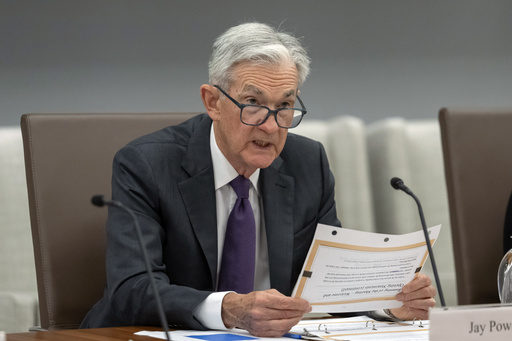In deliberations over the Federal Reserve’s monetary policy, Chair Jerome Powell reaffirmed that the central bank would maintain its current interest rate to assess the impact of the tariffs introduced by President Donald Trump. Despite repeated pressure from the White House for lower interest rates, Powell has taken a cautious stance, emphasizing the need to monitor the economy before making any rate adjustments. Speaking at a European Central Bank conference in Sintra, Portugal, Powell acknowledged the potential for U.S. inflation to rise later in the summer due to these tariffs, but admitted the scale and timing of such increases remain uncertain.
Powell highlighted the prudence of remaining on hold with rates, as the economy remains stable. This approach contrasts sharply with the Trump administration’s agenda; President Trump has actively lobbied for rate cuts, asserting that reduced borrowing costs would benefit taxpayers and spur economic growth. The discord between Powell’s strategy and Trump’s expectations underscores a tension that threatens the traditional independence of the Federal Reserve. Trump’s criticism hasn’t swayed market responses, especially after legal indications suggested the president could not oust the Fed chair.
During his remarks, Powell noted that absent the tariff considerations, current economic conditions might have warranted a rate cut. The Federal Reserve’s cautious approach came as a response to Trump’s expansive tariff announcements, which prompted economists to anticipate rising inflationary pressures. Powell did not dismiss the possibility of a rate reduction in the subsequent Fed meeting scheduled for late July, though many economists predict such adjustments may not occur before September.
In addition, Powell faced renewed scrutiny from Trump, who expanded his criticisms to include the entire Federal Reserve board. The president’s remarks pointed fingers at the board’s perceived inaction, indirectly amplifying pressure on specific board members, some of whom are speculated as potential successors to Powell when his term expires in May 2026. During a panel discussion, Powell reiterated his commitment to the Federal Reserve’s objectives of maintaining price stability, maximizing employment, and ensuring financial stability, downplaying the impact of the president’s critiques.
Central bankers from around the world, including Christine Lagarde from the European Central Bank, Kazuo Ueda from the Bank of Japan, and Andrew Bailey from the Bank of England, expressed support for Powell’s position. Lagarde affirmed that her stance aligned with Powell’s, indicating a unified front among prominent global financial leaders.
In a social media post, President Trump drew comparisons between U.S. interest rates and those set by other nations, highlighting countries with significantly lower rates and suggesting the U.S. should follow suit. However, these countries typically lower rates to stimulate struggling economies. The Federal Reserve, meanwhile, raised rates significantly in 2022 and 2023 to counteract severe inflationary pressures last seen four decades ago.
While Trump argues that reduced Fed rates could substantially decrease the government’s borrowing expenses, it’s uncertain whether such adjustments would translate to lower consumer borrowing costs like mortgages or business loans. The Fed’s rate influences other interest rates, but market forces remain influential. Consequently, a Fed rate cut does not guarantee a decrease in Treasury security rates or long-term borrowing costs, such as mortgage rates, which are influenced by the 10-year Treasury yield. Last year, an initial Fed rate cut prompted a rise in this yield, raising mortgage and other loan costs.
The Federal Reserve has sustained a steady short-term interest rate throughout the year, maintaining it around 4.3% following several cuts in 2024. In June, Powell hinted that the central bank was observing the summer’s developments, particularly the impact of tariffs on inflation, suggesting any decision on rate cuts might occur in September. Nonetheless, subsequently, Fed members Waller and Michelle Bowman, both Trump appointees, expressed skepticism about the likelihood of sustained inflation due to tariffs and hinted at supporting a rate cut in July.
Despite the broad imposition of tariffs on nearly all U.S. imports, inflation has cooled, with consumer prices rising by just 2.4% in May compared to the previous year, approaching the Federal Reserve’s 2% target and marking a significant decline from the prior year.


